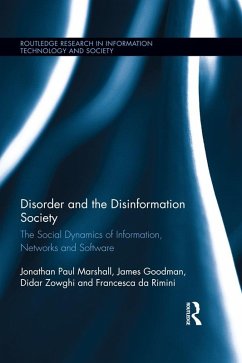This book is the first general social analysis that seriously considers the daily experience of information disruption and software failure within contemporary Western society. Through an investigation of informationalism, defined as a contemporary form of capitalism, it describes the social processes producing informational disorder. While most social theory sees disorder as secondary, pathological or uninteresting, this book takes disordering processes as central to social life. The book engages with theories of information society which privilege information order, offering a strong counterpoint centred on "e;disinformation."e; Disorder and the Disinformation Society offers a practical agenda, arguing that difficulties in producing software are both inherent to the process of developing software and in the social dynamics of informationalism. It outlines the dynamics of software failure as they impinge on of information workers and on daily life, explores why computerized finance has become inherently self-disruptive, asks how digital enclosure and intellectual property create conflicts over cultural creativity and disrupt informational accuracy and scholarship, and reveals how social media can extend, but also distort, the development of social movements.
Dieser Download kann aus rechtlichen Gründen nur mit Rechnungsadresse in A, B, BG, CY, CZ, D, DK, EW, E, FIN, F, GR, HR, H, IRL, I, LT, L, LR, M, NL, PL, P, R, S, SLO, SK ausgeliefert werden.









